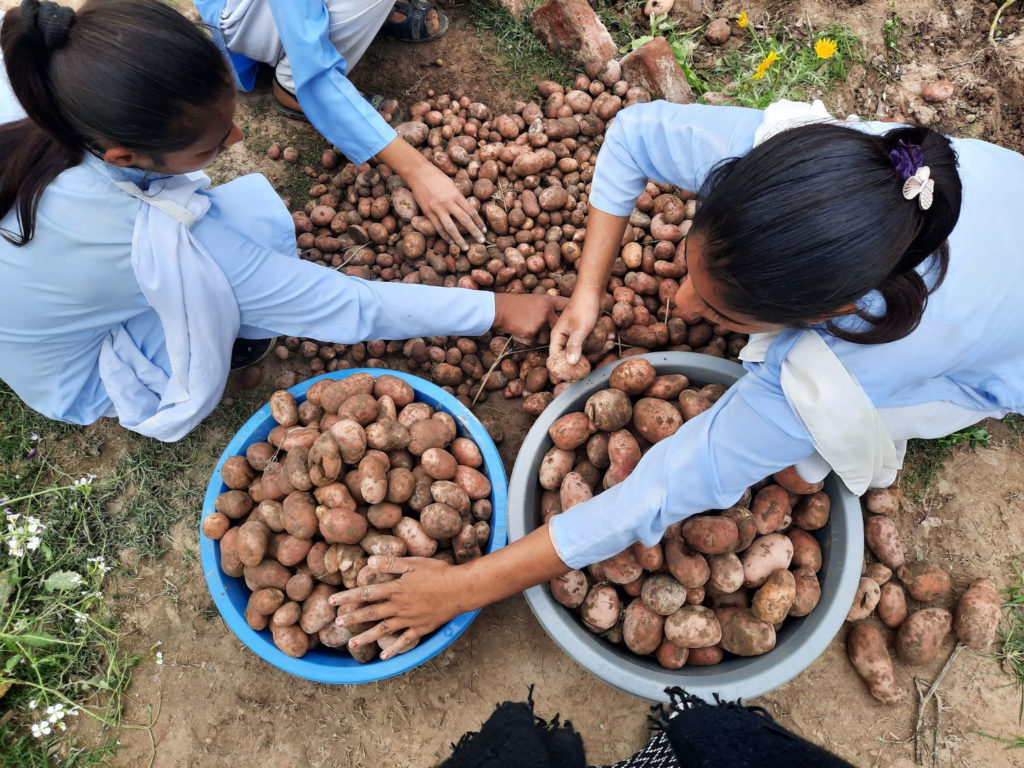This write-up is based on a session organised by PAN Asia Pacific at the Oxford Real Farming Conference 2023 entitled “Future in the Hands of Young People: Moving from pesticides to agroecology in Asia.” A video recording of the session can also be found below.
Children can be most vulnerable to the impacts of pesticides because they breathe more air, eat more food, and drink more water per unit of their body weight than adults, leading to greater exposure to a toxin-contaminated environment. Early-life exposure can damage the developing brain and body, leading to a range of diseases and disorders. Public health experts now consider pesticides to be causing a “silent pandemic” through their neurodevelopmental impacts and adverse effects on the health and intelligence of children.
It is of great importance to include children in the remedial action as they are the future leaders and decision makers. Educating and immersing children in practices that are in harmony with nature and showing them the comparative advantages of protecting soil life, biodiversity and the environment is the way forward.
Thanal Agroecology Center, based in Kerala, India, has a youth team that leads efforts to engage children and the youth in agroecology. For instance, the youths assist in planting rice, saving seeds, and monitoring responses to climate change in Thanal’s Rice Diversity Block, which boasts of over 300 indigenous rice varieties. Students are encouraged to enroll in a 5-week internship program in the center, also known as a Field Learning Site of the International People’s Agroecology Multiversity (IPAM).
Meanwhile, through school exposure programs, younger kids get to learn about food and sustainable farming. “We invite and allow children to play and wander in the fields and enjoy the diversity and soil,” said Jayakumar Chelaton, director of Thanal.
A special program for the tribal youth, supported by the state government, focuses on rediscovering agricultural traditions, as well as co-creating new knowledge on farming. “Working in demo farms, the tribal youth learn things such as technical animal care from experts. What they missed learning from formal school systems, they are now rediscovering from their elders and the community,” Chelaton added.
Janeesha, a youth from the Kurumba tribe in Attappady, Kerala, said that her family has been doing tribal agriculture for 40 years. She has been involved in Thanal’s workshops indigenous farming systems since childhood, making her a highly knowledgeable farmer at the age of 23. For the past two years, she has been working in her parents’ land, planting several varieties of millets and vegetables. “One of the main challenges we are facing are changing climate patterns, for instance, when the monsoon is delayed,” she said. For her, the support of the state government is crucial in ensuring their livelihoods are protected.
Khoj – Society for People’s Education based in Lahore, Pakistan pioneered alternative education on agroecology in the country. Based on local relevance and integration, Khoj operates on the principle that farming based on nature is a guarantee to protect our children and life on the planet.
“We have introduced a full-credit programme on agroecology by children in schools. The program starts from building a living soil, then building a natural ecosystem to saving seeds,” said Nasira Habib, KHOJ founder and director. “Initially from schools, the campaign for organic home gardening went to communities. Now, there are many places in Pakistan where communities enthusiastically work on agroecology and produce safe and nutritious food,” she went on.

Noor Fatima is one of the thousands of youth who have been schooled by Khoj. “I studied at Khoj School for Community Education in Thathi Bhanguan village. My school is different from other schools. In addition to other subjects, I studied about gardening, nutrition and health. We have a school garden for hands-on learning. I learnt how to make natural fertilisers. We use natural seeds. I learnt to save seeds. I learnt about beneficial insects and companion plants. Now I know several methods of natural plant protection,” she said.
Noor, who is now a teacher, is eager to pass on her knowledge and skills to other children in the community.
Meanwhile, in indigenous farming communities in Sabah, Malaysia, PACOS (Partners of Community Organizations in Sabah) Trust involves the youth in community learning centers, where agroecological practices are taught and shared. “It is important to start them very young,” said Anne Lasimbang, executive director of PACOS Trust.
Indigenous farming practices are intertwined with cultural traditions and beliefs that foster harmony with nature. “When harvesting, we do not take everything. We leave something for the birds & other animals,” she said. Through agroecological practices, the youth are also able to be attuned to their cultural identities and cultivate stewardship towards their ancestral lands.
These communities across Asia have shown that the youth can provide leadership and guidance in moving away from pesticides dependence towards agroecology. Children can easily grasp the basic principles of agroecology—the importance of a healthy and clean environment, safe and nutritious food, and biodiverse ecosystems. As long as they are supported in their knowledge and practice of agroecology towards adulthood, as Janeesha and Noor have shown, there is always hope for the future generations.








Discussion about this post